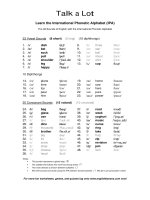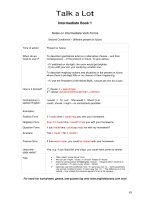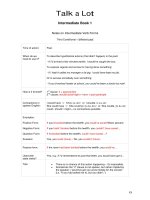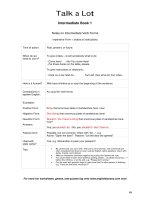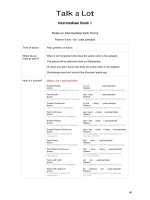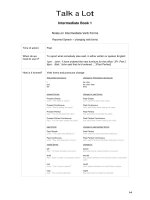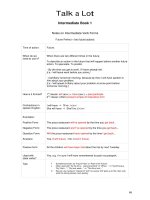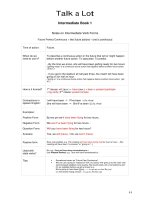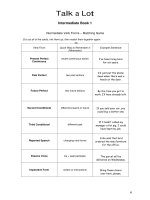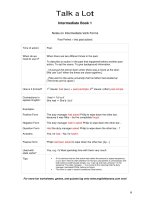talkalot intermediate book 1 reported speech
Bạn đang xem bản rút gọn của tài liệu. Xem và tải ngay bản đầy đủ của tài liệu tại đây (472.59 KB, 2 trang )
Talk a Lot
Intermediate Book 1
Notes on Intermediate Verb Forms
Reported Speech = changing verb forms
Time of action:
Past.
When do we
need to use it?
To report what somebody else said, in either written or spoken English:
1pm: John: “I have ordered the new furniture for the office.” [Pr. Perf.]
6pm: Bob: “John said that he’d ordered…” [Past Perfect]
How is it formed?
Verb forms and pronouns change:
first person pronouns:
change to third person pronouns:
I
you
we
he, she
he, she, they
they
present forms:
change to past forms:
Present Simple
John: “The cake is ready.”
Past Simple
John said the cake was ready.
Present Continuous
John: “We’re eating the cake.”
Past Continuous
John said they were eating the cake.
Present Perfect
Kay: “You’ve finished the cake.”
Past Perfect
Kay said they’d finished the cake.
Present Perfect Continuous
Kay: “You’ve been eating the cake.”
Past Perfect Continuous
Kay said they’d been eating the cake.
past forms:
change to past perfect forms:
Past Simple
John: “The cake was delicious.”
Past Perfect
John said the cake had been delicious.
Past Continuous
John: “Kay was baking for hours.”
Past Perfect Continuous
John said that Kay had been baking for hours.
modal forms:
change to:
will
Kay: “I’ll make another one soon.”
would
Kay said she’d make another one soon.
shall
Kay: “Shall I make a chocolate cake?”
should
Kay asked whether she should make a chocolate
cake.
can
John: “Can I have a piece?”
could
John asked whether he could have a piece.
may
Kay: “You may be allowed.”
might
Kay said that he might be allowed.
14
Talk a Lot
Intermediate Book 1
Notes on Intermediate Verb Forms
some modal forms stay the same:
must
Kay: “But you mustn’t eat too much.”
must
Kay said that he mustn’t eat too much.
ought to
ought to
Kay: “You ought to cut down on cakes.” Kay said that he ought to cut down on cakes.
Contractions /
Questions / Negatives /
Passive / State verbs
Tips:
used to
Kay: “You used to be much slimmer.”
used to
Kay said that he used to be much slimmer.
pronouns and adverbs:
change to:
this
John: “This is my cake.”
that
John said that was his cake.
these
Kay: “These are for our guests.”
those
Kay said those were for their guests.
here
Kay: “Leave this cake here.”
there
Kay told him to leave that cake there.
now
Kay: “Bring these cakes now.”
then / at that time
Kay told him to bring those cakes then.
today
John: “I’ll eat this cake today.”
that day / the same day
John said he would eat that cake that day.
yesterday
Kay: “You ate those cakes yesterday.”
the previous day / the day before
Kay said that he’d eaten those cakes the
previous day.
tomorrow
John: “I can finish these cakes
tomorrow.”
the next day / the following day / the day after
John said he could finish those cakes the next
day.
As usual for verb forms.
•
•
•
•
Also called indirect speech
Questions become factual statements.
You could insert “that” after “said” in all of the changed forms. It
may seem a bit fussy these days!
Studying reported speech provides a great workout for
practising verb forms!
For more fun worksheets, games, and quizzes log onto www.englishbanana.com now!
15
